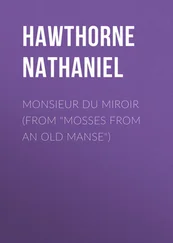Nathaniel Hawthorne - Nathaniel Hawthorne
Здесь есть возможность читать онлайн «Nathaniel Hawthorne - Nathaniel Hawthorne» — ознакомительный отрывок электронной книги совершенно бесплатно, а после прочтения отрывка купить полную версию. В некоторых случаях можно слушать аудио, скачать через торрент в формате fb2 и присутствует краткое содержание. Жанр: foreign_prose, на английском языке. Описание произведения, (предисловие) а так же отзывы посетителей доступны на портале библиотеки ЛибКат.
- Название:Nathaniel Hawthorne
- Автор:
- Жанр:
- Год:неизвестен
- ISBN:нет данных
- Рейтинг книги:3 / 5. Голосов: 1
-
Избранное:Добавить в избранное
- Отзывы:
-
Ваша оценка:
- 60
- 1
- 2
- 3
- 4
- 5
Nathaniel Hawthorne: краткое содержание, описание и аннотация
Предлагаем к чтению аннотацию, описание, краткое содержание или предисловие (зависит от того, что написал сам автор книги «Nathaniel Hawthorne»). Если вы не нашли необходимую информацию о книге — напишите в комментариях, мы постараемся отыскать её.
Nathaniel Hawthorne — читать онлайн ознакомительный отрывок
Ниже представлен текст книги, разбитый по страницам. Система сохранения места последней прочитанной страницы, позволяет с удобством читать онлайн бесплатно книгу «Nathaniel Hawthorne», без необходимости каждый раз заново искать на чём Вы остановились. Поставьте закладку, и сможете в любой момент перейти на страницу, на которой закончили чтение.
Интервал:
Закладка:
Hawthorne Nathaniel
Little Masterpieces
Hawthorne made three collections of his short stories and sketches: "Twice-Told Tales," "Mosses from an Old Manse," and "The Snow Image and Other Tales." The prefaces to these volumes express, with characteristic charm, the author's dissatisfaction with his handiwork. No critic has pointed out so clearly as Hawthorne himself the ineffectiveness of some of the "Twice-Told Tales"; he thinks that the "Mosses from an Old Manse" afford no solid basis for a literary reputation; and his comment upon the earlier and later work gathered indiscriminately into his final volume is that "the ripened autumnal fruit tastes but little better than the early windfalls."
It must be remembered that the collections were made in desultory fashion. They included some work that Hawthorne had outgrown even when the first volume was published, such as elaborate exercises in description and fanciful allegories, excellently composed but without substance. Yet side by side with these proofs of his long, weary apprenticeship are stories that reveal the consummate artist, mature in mind and heart, and with the sure hand of the master. The qualities of imagination and style that place Hawthorne easily first among American writers of fiction are as readily discernible in his best brief tales as in his romances.
"Dr. Heidegger's Experiment," with which the present volume opens, is Hawthorne's earliest treatment of the elixir of immortality theme, which haunted him throughout his life and was the subject of the unfinished romance which rested upon his coffin. He handles it daintily, poetically here, with an irony at once exquisite and profound. "The Birthmark" represents another favorite theme: the rivalry between scientific passion and human affection. It is not wholly free from the morbid fancy which Hawthorne occasionally betrays, and which allies him, on one side of his many-gifted mind, with Edgar Allan Poe; but the essential sanity of Hawthorne's moral, and the perfection of the workmanship, render "The Birthmark" worthy of its high place among modern short stories. "Ethan Brand" dates obviously from the sojourn at North Adams, Massachusetts, described in the "American Note-Book." Fragmentary as it is, it is one of Hawthorne's most powerful pieces of writing, the Unpardonable Sin which it portrays – the development of the intellect at the expense of the heart – being one which the lonely romancer himself had had cause to dread. The motive of the humorous character sketch entitled "Wakefield" is somewhat similar: the danger of stepping aside, even for a moment, from one's allotted place. "Drowne's Wooden Image" is a charming old Boston version of the artistic miracles made possible by love. In "The Ambitious Guest," the familiar story of the Willey House, in the Notch of the White Hills, is told with singular delicacy and imaginativeness, while "The Great Stone Face," a parable after Hawthorne's own heart, is suggested by a well-known phenomenon of the same mountainous region. Hawthorne's numerous tales based upon New England history are represented by one of the briefest, "The Gray Champion," whose succinct opening and eloquent close are no less admirable than the stern passion of its dramatic climax.
Not every note of which Hawthorne's deep-toned instrument was capable is exhibited in these eight tales, but they will serve, perhaps, to show the nature of his magic. Certain characteristics of his art are everywhere in evidence: simplicity of theme and treatment, absolute clearness, verbal melody, with now and again a dusky splendor of coloring. The touch of a few other men may be as perfect, the notes they evoke more brilliant, certainly more gay, but Hawthorne's graver harmonies linger in the ear and abide in the memory. It is only after intimate acquaintance, however, that one perceives fully Hawthorne's real scope, his power to convey an idea in its totality. His art is the product of a rich personality, strong, self-contained, content to brood long over its treasures. It is seldom in the history of literature – and quite without parallel in American letters – that a nature so perfectly dowered should attain to such perfect self-expression. Here lies his supreme fortune as an artist. He was permitted to give adequate expression to a rare and beautiful genius, and for thousands of his countrymen life has been touched to finer issues because Hawthorne followed his boyish bent and became a writer of fiction.
Bliss Perry.Dr. Heidegger's Experiment
That very singular man, old Dr. Heidegger, once invited four venerable friends to meet him in his study. There were three white-bearded gentlemen, Mr. Medbourne, Colonel Killigrew, and Mr. Gascoigne, and a withered gentlewoman, whose name was the Widow Wycherly. They were all melancholy old creatures, who had been unfortunate in life, and whose greatest misfortune it was that they were not long ago in their graves. Mr. Medbourne, in the vigor of his age, had been a prosperous merchant, but had lost his all by a frantic speculation, and was now little better than a mendicant. Colonel Killigrew had wasted his best years, and his health and substance, in the pursuit of sinful pleasures, which had given birth to a brood of pains, such as the gout, and divers other torments of soul and body. Mr. Gascoigne was a ruined politician, a man of evil fame, or at least had been so, till time had buried him from the knowledge of the present generation, and made him obscure instead of infamous. As for the Widow Wycherly, tradition tells us that she was a great beauty in her day; but, for a long while past, she had lived in deep seclusion, on account of certain scandalous stories, which had prejudiced the gentry of the town against her. It is a circumstance worth mentioning, that each of these three old gentlemen, Mr. Medbourne, Colonel Killigrew, and Mr. Gascoigne, were early lovers of the Widow Wycherly, and had once been on the point of cutting each other's throats for her sake. And, before proceeding further, I will merely hint, that Dr. Heidegger and all his four guests were sometimes thought to be a little beside themselves; as is not unfrequently the case with old people, when worried either by present troubles or woful recollections.
"My dear old friends," said Dr. Heidegger, motioning them to be seated, "I am desirous of your assistance in one of those little experiments with which I amuse myself here in my study."
If all stories were true, Dr. Heidegger's study must have been a very curious place. It was a dim, old-fashioned chamber, festooned with cobwebs and besprinkled with antique dust. Around the walls stood several oaken bookcases, the lower shelves of which were filled with rows of gigantic folios and black-letter quartos, and the upper with little parchment-covered duodecimos. Over the central bookcase was a bronze bust of Hippocrates, with which, according to some authorities, Dr. Heidegger was accustomed to hold consultations, in all difficult cases of his practice. In the obscurest corner of the room stood a tall and narrow oaken closet, with its door ajar, within which doubtfully appeared a skeleton. Between two of the bookcases hung a looking-glass, presenting its high and dusty plate within a tarnished gilt frame. Among many wonderful stories related of this mirror, it was fabled that the spirits of all the doctor's deceased patients dwelt within its verge, and would stare him in the face whenever he looked thitherward. The opposite side of the chamber was ornamented with the full-length portrait of a young lady, arrayed in the faded magnificence of silk, satin, and brocade, and with a visage as faded as her dress. Above half a century ago, Dr. Heidegger had been on the point of marriage with this young lady; but, being affected with some slight disorder, she had swallowed one of her lover's prescriptions, and died on the bridal evening. The greatest curiosity of the study remains to be mentioned; it was a ponderous folio volume, bound in black leather, with massive silver clasps. There were no letters on the back, and nobody could tell the title of the book. But it was well known to be a book of magic; and once, when a chambermaid had lifted it, merely to brush away the dust, the skeleton had rattled in its closet, the picture of the young lady had stepped one foot upon the floor, and several ghastly faces had peeped forth from the mirror; while the brazen head of Hippocrates frowned, and said, "Forbear!"
Читать дальшеИнтервал:
Закладка:
Похожие книги на «Nathaniel Hawthorne»
Представляем Вашему вниманию похожие книги на «Nathaniel Hawthorne» списком для выбора. Мы отобрали схожую по названию и смыслу литературу в надежде предоставить читателям больше вариантов отыскать новые, интересные, ещё непрочитанные произведения.
Обсуждение, отзывы о книге «Nathaniel Hawthorne» и просто собственные мнения читателей. Оставьте ваши комментарии, напишите, что Вы думаете о произведении, его смысле или главных героях. Укажите что конкретно понравилось, а что нет, и почему Вы так считаете.












